ARE STEAMFUNK, DIESELFUNK and SWORD & SOUL NECESSARY? Countering Negative Images of Black People in Science Fiction and Fantasy
Countering Negative Images of Black People in Science Fiction and Fantasy
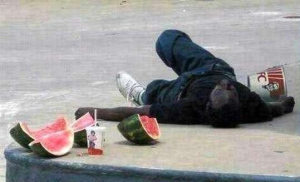 Images and words combined are very powerful, and have been used, quite effectively, to convey this whole idea of Black people being “less than”; “not as good as”: the myth of Black inferiority.
Images and words combined are very powerful, and have been used, quite effectively, to convey this whole idea of Black people being “less than”; “not as good as”: the myth of Black inferiority.
We have become so insensitive or desensitized to our own negative typecasting and even dehumanization that we are no longer conscious of what we see, hear and what is going into our minds. We have become a party to our own brainwashing. We have joined in and become our own victimizers.
In the old days, white comedians put on black cork and made a living humiliating and ridiculing Black people. A few years later, their senses dulled by this illusion called “progress”, Black comedians said to the white comedians “Hey, you don’t have to ridicule and humiliate us, we’ll do it. We’ll take it from here, boss.”
And they took it from there…and carried it straight to Hell.
Let’s take the use of the word “nigger”, for example; so talked about now because of its use 110 times in the movie Django Unchained. Black comedians took this wicked, destructive word and took ownership of it as if to call ourselves a nigger was empowering, as if it was a term of endearment and still vehemently defend its use to this very day. And no, saying “the N-word” is no better. It is just foolish and strangely, makes us even less human than our use of nigger does.
“Man, you my N-Word!”
Or Kanye West and Jay-Z’s popular Niggas In Paris, now the politically correct N-Words In Paris:
“What’s Gucci my N-Word?
What’s Louis my killa?
What’s drugs my deala?
What’s that jacket, Margiela?
Doctors say I’m the illest
Cause I’m suffering from realness
Got my N-Words in Paris
And they goin’ gorillas, heh?”
Yeah…that shit cray.
The historian Carter G. Woodson said that Black people have been conditioned to go around to the back door, and if there is no back door, we will insist on one.
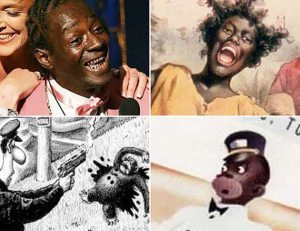 If you can get a Black comedian to show up on a late-night talk show and act the clown, it’s comforting to those people who say, “See they are a happy people. They aren’t angry with us for five hundred years of slavery and oppression.” It is like approaching a dog you have abused, neglected and chained up in your kitchen for a week, thinking “Boy, I sure hope it doesn’t bite.” And if, instead of tearing out your throat, the dog starts wagging its tail, you breathe a sigh of relief and say “Whew, good dog.”
If you can get a Black comedian to show up on a late-night talk show and act the clown, it’s comforting to those people who say, “See they are a happy people. They aren’t angry with us for five hundred years of slavery and oppression.” It is like approaching a dog you have abused, neglected and chained up in your kitchen for a week, thinking “Boy, I sure hope it doesn’t bite.” And if, instead of tearing out your throat, the dog starts wagging its tail, you breathe a sigh of relief and say “Whew, good dog.”
We have been conditioned to expect little of ourselves and of each other.
Many Black authors lament that they create great content, but Black people pass by their table at geek conventions and head straight to Jim Butcher’s table to purchase his Dresden Files novels, or to the Marvel Comics booth to pick up the latest X-Man graphic novel.
Don’t lament, Black author. Remember, we have been conditioned to expect little of ourselves and of each other, so most Black people will assume, without any evidence, that your work is wack. You have to reach out and educate them; show them that your work is just as good as – or better than, what they are used to. Most will still flock to the Marvel booth. They love – and have faith in – good ol’ Stan Lee. To chastise them for that will gain you enemies, not friends and certainly not fans.
Now, outside the Black geek community is where I have found my greatest support. There is a hunger among “regular” Black people – those who do not identify as geeks, nerds, or science fiction fans – for speculative fiction written by and about Black people.
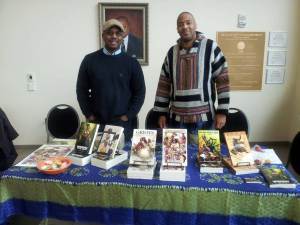 At the Westview Festival last year – a neighborhood festival in the predominantly Black, lower-to-middle-class area near Atlanta’s West End – I sold out all of my books in less than a half hour. Mind you, my table was next to a table that sold – at less than half price – mainstream fiction and science fiction and fantasy by authors such as Isaac Asimov, J.R.R. Tolkien, Frank Herbert and George R.R. Martin.
At the Westview Festival last year – a neighborhood festival in the predominantly Black, lower-to-middle-class area near Atlanta’s West End – I sold out all of my books in less than a half hour. Mind you, my table was next to a table that sold – at less than half price – mainstream fiction and science fiction and fantasy by authors such as Isaac Asimov, J.R.R. Tolkien, Frank Herbert and George R.R. Martin.
At the recent 3rd Annual Ujamaafest – a festival celebrating Kwanzaa’s principle of Collective Economics – Milton Davis and I shared a table. Once again, Black Speculative Fiction sold like hotcakes. At this festival, the participants were mainly culturally conscious Black people from all walks of life.
At both festivals, most of the people who purchased books said that if Black authors were writing Science Fiction and Fantasy, with Black heroes, when they were young, they would have been into it, but they were eager to get their children and grandchildren into Black Speculative Fiction.
Are Steamfunk, Dieselfunk, Sword & Soul and other Black Speculative Fiction necessary? Damn right, they are.
While many of us want to see ourselves as the heroes and sheroes and recognize the need for Black Speculative Fiction, many of us cannot fathom ourselves as star-spanning, evil-crushing, saving-the-world heroes. The horse wrangler for the Steamfunk feature film Rite of Passage told me he never imagined we could be the heroes in a Fantasy or Science Fiction story, or that such a movie would ever be created.
The media is directly responsible for this. The perpetuation of stereotypes is always done through print, television, film, radio, music and, now, the internet.
Flip the channel or turn the page and there are the “baby mamas” and “baby daddies” so ubiquitous in common American culture that they become plot points or titles for mainstream comedies and movies.
The syndicated television program Maury, hosted by Maury Povich, is known for its “Who’s Your Daddy?” segments. Much of the content is based on issuing paternity tests to teens and young adults in hopes of determining fatherhood.
Many of Maury’s guests are Black, and the sheer number of these cases is damning. Shows like these, along with court television shows that promote the same dysfunction, are very popular.
Even Black millionaire housewives, doctors and business moguls are portrayed as argumentative, catty, incapable of being unified and downright ig’nant.
Millions of viewers are indoctrinated by these images of Black family chaos. And we watch these programs like a gory highway car wreck because they involve so many people who look like us.
And we accept and share these perceptions without question, qualm or quarrel.
At a very young age, Black men and women are inundated with messages that they cannot trust or depend upon one other. Children see images of – and hear comments and jokes about – lazy, greedy, irresponsible, or otherwise flawed Black adults.
Black characters have appeared in American films since the beginning of the industry in 1888, but Black actors were not even hired to portray Black people in early works. Instead, white actors and actresses were hired to portray the characters while in “blackface.”
In addition, Black people have, for nearly a hundred years, been purposely portrayed in films with negative stereotypes that reinforce white supremacy over us. Since motion pictures have had more of an impact on the public mind than any other entertainment medium in the last ninety years, this has had a tremendous effect on society’s view of Black people.
 The media sets the tone for the morals, values, and images of our culture. Many people in this country believe that the degrading stereotypes of Black people are based on reality and not fiction. Everything they believe about us is determined by what they see on television. After over a century of movie making, these horrible stereotypes continue to plague us today, and until negative images of Black people are extinguished from the media, we will be regarded as second-class citizens and will regard ourselves as such.
The media sets the tone for the morals, values, and images of our culture. Many people in this country believe that the degrading stereotypes of Black people are based on reality and not fiction. Everything they believe about us is determined by what they see on television. After over a century of movie making, these horrible stereotypes continue to plague us today, and until negative images of Black people are extinguished from the media, we will be regarded as second-class citizens and will regard ourselves as such.
We have not come that far since 1914, when Sam Lucas was the first black actor to have a lead role in a movie for his performance in Uncle Tom’s Cabin.
1915 is a significant date in motion picture history because D.W. Griffith released The Birth of a Nation, which supported the Ku Klux Klan and is possibly the most anti-Black film ever made.
The Birth of a Nation – with its vicious portrayal of Black people as subhuman compared to the glorified Ku Klux Klan – was important because it led to the creation of a new industry that produced “race films” for Black People. These films portrayed us in a positive light and addressed many social concerns of the community.
Before “race films,” Black people in films were nothing more than shuffling, shiny-faced, head-scratching simpletons with bugged out eyes who leaned on brooms and spoke bad English, but after the introduction of “race films,” we were depicted with more dignity and respect.
In order for Black people to ensure that they would have positive roles and stop reinforcing negative stereotypes through film, we had to make our own movies. The same holds true today.
I am asked, quite often, if there is such a thing as a Black Science Fiction movie. Supposing by “Black Science Fiction movie”, they mean a science fiction or fantasy movie that features a Black protagonist and majority Black cast and deals with issues that strongly impact Black people, I tell them that Black Science Fiction movies began in 1939, with the release of Son of Ingagi and that filmmakers continue to make quality Black Science Fiction movies today.
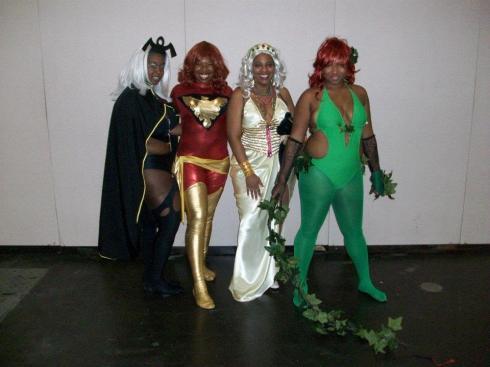 We learn a great deal about human nature by comparing ourselves to others; and by comparing ourselves to fictional heroes…and villains.
We learn a great deal about human nature by comparing ourselves to others; and by comparing ourselves to fictional heroes…and villains.
Contemplating fictional characters helps us examine the nature of heroism and villainy. Through fiction, film and television, we develop our view of the ideal person; we learn what to expect from good guys and bad guys, even in real life.
What distinguishes a superhero from a supervillain? How do their basic personalities differ — and how has the media affected our perception of ourselves and heroism?
Most people see themselves as being close in personality to their favorite superheroes and mimic their heroes’ characteristics in an effort to live up to that perception.
However, if the fiction you read or see consistently portrays those who look like you as less than heroic; as savage – whether noble, or not – as the eternal sidekick; as the first to die; as the one to sacrifice him or herself so that the real heroes can save the world; as the thug; the pimp; the whore, then how do you see yourself?
In Blueprint for Negro Literature, Richard Wright discussed the problem of Black literature:
“They [Black authors] entered the Court of American Public Opinion dressed in the knee-pants of servility, curtsying to show that the Negro was not inferior, that he was human, and that he had a life comparable to that of other people. These were received as poodle dogs, who have learned clever tricks. … In short, Negro writing on the whole has been the voice of the educated Negro pleading with white America.”
Wright went on to say that every story Black people write “should carry within its lines, implied or explicit, a sense of the oppression of the Negro people, the danger of war, of fascism, of the threatened destruction of culture and civilization; and, too, the faith and necessity to build a new world.”
While such pleading – such “curtsying to show that we are not inferior” – may have been the goal of Black writers during Wright’s time, it is certainly not my goal or the goal of my colleagues.
On the contrary, I seek to show Black people, in general – teens and tweens, in particular – that we are not inferior; that we are heroic; that we are beautiful, courageous, brilliant and strong.
Furthermore, while I appreciate a good story that deals with the ills of racism, sexism, classism and the destruction and rebuilding of Black civilization, I do not feel that every story must, or even should, deal with such issues.
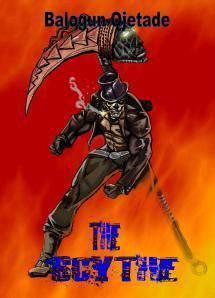 What I do feel Black Speculative Fiction should do is tell our stories, because they have gone untold in Speculative fiction for so damned long. And I feel those stories should feature Black heroes and an occasional Black villain, too…a criminal mastermind, that is; not a damned street thug, or other walking stereotype.
What I do feel Black Speculative Fiction should do is tell our stories, because they have gone untold in Speculative fiction for so damned long. And I feel those stories should feature Black heroes and an occasional Black villain, too…a criminal mastermind, that is; not a damned street thug, or other walking stereotype.
And please, no more Black heroes who begin as gangsters, prostitutes, drug dealers, or dope fiends. Thanks.
If you are seeking a list of works of great Black Speculative Fiction, check it out here. For a list of great Black authors of Speculative Fiction, you can find that here. For a list of Black Speculative events in Atlanta in celebration of Black History Month, look here.
So, do you feel Steamfunk, Dieselfunk and Sword & Soul are necessary? Is there a type of Black Speculative Fiction you’d like to see created or more of? Horror? Dystopian? Young Adult glittery vampires?
Comment and let your opinion be known!





